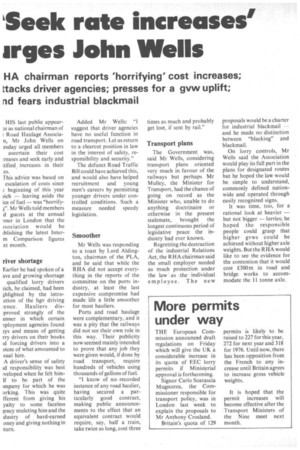'Seek rate increases' irges John Wells
Page 16

If you've noticed an error in this article please click here to report it so we can fix it.
HA chairman reports 'horrifying' cost increases; ttacks driver agencies; presses for a gvw uplift; nd fears industrial blackmail
HIS last public appear as national chairman of ! Road Haulage Associan, Mr John Wells on esday urged all members ascertain their cost :reases and seek early and tified increases in their .es.
This advice was based on escalation of costs since beginning of this year iich — leaving aside the ice of fuel — was "horrifyg". Mr Wells told members d guests at the annual aner in London that the isociation would be iblishing the latest Interm Comparison figures xt month.
river shortage
Earlier he had spoken of a aye and growing shortage qualified lorry drivers tich, he claimed, had been ;hlighted by the intro.ction of the hgv driving :ence. Hauliers disproved strongly of the miner in which certain lployment agencies found tys and means of getting rry drivers on their books id forcing drivers into a stem of what amounted to sual hire.
A driver's sense of safety id responsibility was best :veloped when he felt himIf to be part of the impany for which he was orking. This was quite fferent from giving his yalty to some faceless ;ency mulcting him and the dustry of hard-earned oney and giving nothing in turn. Added Mr Wells: "I suggest that driver agencies have no useful function in road transport. Let us return to a clearcut position in law in the interest of safety, responsibility and security."
The defunct Road Traffic Bill could have achieved this, and would also have helped recruitment and young men's careers by permitting younger drivers under controlled conditions. Such a measure needed speedy legislation.
Smoother
Mr Wells was responding to a toast by Lord Aidington, chairman of the PLA, and he said that while the RHA did not accept everything in the reports of the committee on the ports industry, at least the last expensive compromise had made life a little smoother for most hauliers.
Ports and road haulage were complementary, and it was a pity that the railways did not see their own role in this way. Their publicity now seemed mainly intended to prove that any job they were given would, if done by road transport, require hundreds of vehicles using thousands of gallons of fuel.
"I know of norecorded instance of any road haulier, having secured a particularly good contract, making public announcements to the effect that an equivalent contract would require, say, half a train, take twice as long, cost three times as much and probably get lost, if sent by rail."
Transport plans
The Government was, said Mr Wells, considering transport plans oriented very much in favour of the railways but perhaps Mr Mulley, the Minister for Transport, had the chance of going on record as the Minister who, unable to do anything doctrinaire or otherwise in the present stalemate, brought the longest continuous period of legislative peace the industry had ever known.
Regretting the destruction of the industrial Relations Act, the R HA chairman said the small employer needed as much protection under the law as the individual employee. The new proposals would be a charter for industrial blackmail and he made no distinction between "blacking" and blackmail.
On lorry controls, Mr Wells said the Association would play its full part in the plans for designated routes but he hoped the law would be simple to understand, commonly defined nationwide and operated through easily recognized signs.
It was time, too, for a rational look at heavier — but not bigger — lorries; he hoped the responsible people could grasp that higher gvws could be achieved without higher axle weights. But the R HA would like to see the evidence for the contention that it would cost £300m in road and bridge works to accommodate the 11 tonne axle.








































































































